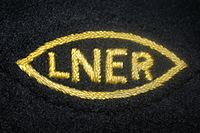LNER
 |
|
| Dates of operation | 1 January 1923– 31 December 1947 |
|---|---|
| Predecessor |
Great Eastern Railway Great Central Railway Great Northern Railway Great North of Scotland Railway Hull and Barnsley Railway North British Railway North Eastern Railway and others |
| Successor |
Eastern Region North Eastern Region Scottish Region |
| Track gauge | 4 ft 8 1⁄2 in (1,435 mm) |
| Length | 6,590 miles (10,610 km) |
The London and North Eastern Railway (LNER) was the second largest of the "Big Four" railway companies created by the Railways Act 1921 in Britain. It operated from 1 January 1923 until nationalisation on 1 January 1948. At that time, it was divided into the new British Railways' Eastern Region, North Eastern Region, and partially the Scottish Region.
Sir Ralph Wedgwood was the Chief Officer for its first 16 years.
The principal constituents of the LNER were:
The total route mileage was 6,590 miles (10,610 km). The North Eastern Railway had the largest route mileage, 1,757 miles (2,828 km), the Hull and Barnsley Railway just 106.5 miles (171.4 km).
The LNER owned:
In partnership with the London, Midland and Scottish Railway (LMS), the LNER was co-owner of the Midland and Great Northern Joint Railway, the UK's biggest joint railway, much of which competed with the LNER's own lines. The M&GNJR was incorporated into the LNER in 1936. In 1933, on the formation of the London Passenger Transport Board, the LNER acquired the remaining operations of the Metropolitan Railway Company.
The LNER was the majority partner in the Cheshire Lines Committee and the Forth Bridge Railway Company.
The LNER covered the area north and east of London. It included the East Coast Main Line from London to Edinburgh via York and Newcastle upon Tyne and the routes from Edinburgh to Aberdeen and Inverness. Most of the country east of the Pennines was within its purview, including East Anglia. The main workshops were in Doncaster, with others at Darlington, Inverurie and Stratford, London.
...
Wikipedia
